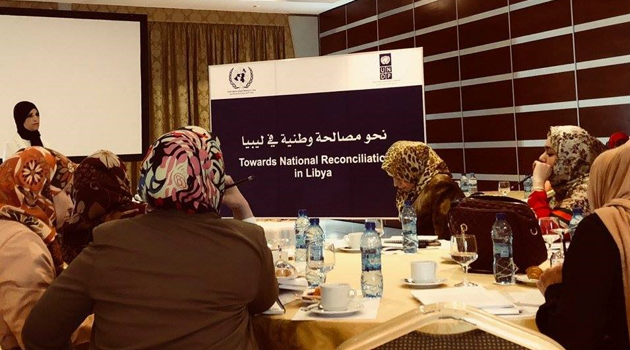“Exchanging ideas with other women from both tribes was very good. We worked as a team and learned a lot about our role as women in reconciliation,” one of Qadadfa tribe’s participants elaborated. “I will share what I have learned in these sessions with women in south, especially with women from my tribe” she added.
Under the theme “Women’s Role in Promoting Local Reconciliation in the South, Gadhadfa and Awlad Suleiman - case study,” the participants learned about previous peace efforts such as the Tebu-Tuareg conflict, and the role that women played in those process, as well as examples of successful steps of negotiations.
At the end of the workshop, the participants agreed on a series of concrete actions to build confidence and encourage participation of women in dialogue, peace efforts and conflict prevention at the local level in reconciliation processes in the South.
“We want to influence people around us, our families, our community, our tribe, so we decided [women from Qadadfa & Awlad Suliman tribes], to form a team and create a channel on social media to share information that could be useful for our future work and activities on reconciliation between tribes”, stated one of the participants from Awlad Sulaiman tribe.
“Reconciliation in the South is not easy to achieve because of a strong attachment of some parties to the former regime. They don’t accept the new governmental change in Libya. I believe more workshops and meetings on reconciliation, which can bring together the parties in conflict will help communities to understand the current situation, the changes, and the importance of reconciliation and peacemaking.” concluded one of the participants from Qadadfa tribe.
The meeting was convened as part of the project “Towards National Reconciliation in Libya,” jointly implemented by UNSMIL and UNDP. The initiative aims at assisting Libyan national and local authorities, civil society and other partners in their effort to promote an inclusive vision for a comprehensive national reconciliation strategy.
(Source: UNDP)





